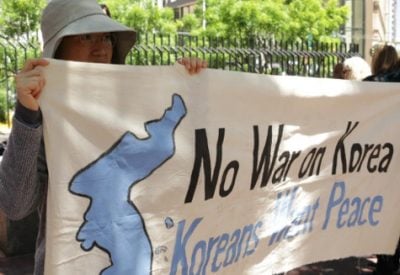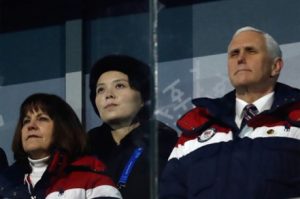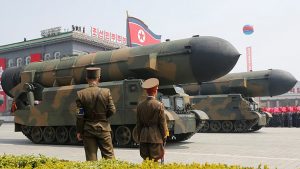Peace on the Korean Peninsula at Last?

One of the unexpected events that happened during the PyongChang Olympics was the remarkable diplomatic manoeuvre of the three stars: Moon Jae-in, Kim Jong-un and Donald Trump.
Moon Jae-in convinced Kim Jong-un to send a large delegation to PyomgChang and show to the world that North Korea was not a country ruled by an irrational man;
Kim Jong-un told the world that he wanted peace;
Trump made it clear that he was not Obama, who according to Trump did nothing to solve the North Korean nuclear crisis.
Moreover, the “three stars: have made it possible to have two historical summits: the inter-Korea summit and the U.S.-North Korea summit.
That is great, but what can we expect from these summits? One thing is sure; each of the stars seems to have different hopes and expectations. Whatever their hopes and expectations may be, these summit must bring peace in the Korean peninsula after seventy years of unnecessary uncertainty, fragile security, fear and tension.
The PyongChang Meetings
The PyongChang Olympics may have written a new page in the modern history of world diplomacy. The world was expecting the worst scenario of Trump’s war against Kim Jong-un and the very success of the Olympics was in doubt. But, the war did not show its ugly teeth, not yet anyway; the youth of the world competed, fraternized, shared the victory and showed sincere friendship in defeat. Yes, the PyongChang was a success as a sport festivity.
But there was something else. We were all impressed with the silent, elegant and dignified diplomacy of Kim Yo-Jong, sister of Kim Jong-un; we were all touched by the honest effort of the North-South combined women hockey team who worked hard together in harmony despite seventy years of ideological separation. The world class performance of the North Korean musical group made us wonder how a country under the constant threats from outside and inhuman sanctions for so long could produce such a team.
Moreover, the PyongChang has provided a diplomatic arena where three stars performed well. Moon Jae-in took an initiative, in consultation with Trump, to invite a huge delegation of North Korea to PyongChang and succeeded in creating a peace mood. In return, Kim Jung-un has invited in early March special envoy of Moon Jae-in to Pyongyang where Moon Jae-in was invited to a summit with Kim at the end of April. The same envoy went to Washington and reported to Trump of Kim Jong-un’s wish to meet with Trump, who accepted Kim’s invitation. Trump suggested the end of May as the date of the summit. This drama of diplomacy is so unexpected and so dramatic that the world- frankly speaking- felt a little dizzy. Another surprising event was the reaction of Xi Jinping and Abe. Both welcomed the double summits and claimed their piece of peace pie evoking their role in international sanctions against Kim Jong-un.
It goes without saying that we all wish for successful summits. But we are not sure how these summits will come out. Nonetheless, we may allow ourselves to have an idea about the motivations of the summit stars. If we know the motivations of the stars, we may able to have an idea about the summit outcomes. What are the reasons for Kim Jung-un for transforming himself from being a man of reckless worrier to a man of peace? What does Trump hope to gain? What has motivated Moon Jae-in to go between Donald Trump and Kim Jung-un?
Why the summits?
Let us begin with Kim Jong-un. His decision to seek for peace with the U.S. and its allies may be explained in terms of internal factor as well as external determinants. Internal factors would include the following. First, after the launch of ICBM Hwasung-15 in November last year, reaching as far as 15,000 km, the Juche regime seems to believe that it can now deter nuclear attacks of the U.S.; this was made clear in Kim Jung-un’s New Year Speech. Second, the successful conclusion of the nuclear programs has made Kim Jung-un’s leadership more solid and more consolidated, thus ensuring internal social cohesion and political stability.
Third, the development of private market, the multiplication of mobiles phones allowing the North Koreans the access to outside world’s reality may have made them more open-minded and perhaps desire for more economic development and peace. It is very likely that Kim Jong-un is well aware of this reality and that it can endanger the survival of the Juche regime. But young leader seems to think that his leadership is strong enough to ensure the regime’s survival.
On the other hand, there are also several external determinants of Kim Jong-un’s desire for peace. First, the intensification of nuclear threats and endless sanctions have surely been an important factor of Kim’s decision. So far, North Korea has been successfully minimizing the damaging effect of sanctions mainly through underground network of trade and the emergence of private market and, partially, China’s aid. Now, the situation is different. Since Trump took over the power in Washington, the nuclear threats have become more alarming, while the sanctions have become much more damaging, especially since China joined the international sanctions on North Korea. In such situation, North Korea might have concluded that the peace with the U.S. and its allies was perhaps the only way to save its regime.
Another external factor is the regime change in South Korea. For ten years (2008-2017), South Korea was governed by conservative presidents, Lee Myung-bak (2008-2013) and Park Geun-hye (2013-2017). By the way, both are now in prison for bribery, corruption and abuse of power.
One of the chief characteristics of the conservative governments is its anti-North Korea culture. This is partly explained by the past colonial history. The conservative government of South Korea was formed in 1948 principally by Koreans who served, as high ranking civil servants, under Japanese colonial government; they collaborated for torturing and murdering patriots who fought against Japan. On the other hand, the North Korean government was established by Kim Il-sung and the patriots. Thus, right from the beginning of the era of post-World War II, there has been deep and intense feeling of anger and hostility between the conservative government in the South and North Korean leaders.
This has produced two unfortunate results. First, the conservative governments which have ruled South Korea for sixty years out of seventy years since 1948 have produced a situation where the inter-Korean relation was dominated by mutual hostility, suspicion, mistrust and, above all, tension. Second, the conservative governments have used the inter-Korean tension as a tool of electoral campaign. Prior to elections, the conservative governments often created an environment of fear by fabricating inter-Korean armed clashes or false rumours in such a way that the votes could go to the conservatives, who pretended themselves as the best guarantee of “security”; South Koreans are very sensitive about the security. This unfortunate phenomenon is called the “Book-Poong-Northern Wind”.
Now, in 2017, the liberal government of Moon Jae-in took over the power. Let us remember that Moon was one of the chief architects of the “Sunshine Policy” for ten years from 1998 to 2008. The return of the liberal government under the leadership of Moon could have changed Kim Jong-un’s perception of inter-Korea relations. The young leader of Juche knows that he can trust Moon Jae-in and this might have contributed to his decision to have the inter-Korea summit and even the Washington-Pyongyang summit. It seems that Kim Jong-un relies on Moon Jae-in’s mediation role for the success of the Trump-Kim summit.
Now, let us move to Donald Trump. There may be also internal and external factors which might have led Trump to think of meeting with Kim Jong-un. Internally, the “Russia” gate, the sex scandal and his low popularity might have induced Trump to use the U.S.-North Korea summit as means of turning public concerns away from his internal problems. Besides, Trump promised, during his election campaign, to do something with North Korea, something which previous presidents, especially, Obama did not do. The summit with the young leader of the Juche regime may be the realization of his electoral promise.
The external factor motivating Trump to talk to Kim Jong-un is perhaps his perception of the China containment policy. China is getting stronger every day; Russia is developing new arms including powerful and fast under-water drones. Moreover, both Xi Jinping and Vladimir Putin can now rule for long time to come, perhaps for life time. This could have made trump to re-examine Washington’s relation with Pyongyang; he might have decided to solve the North Korean issues once for all so that he could allocate more resource to the strategy of China containment.
As for Moon Jae-in, several good reasons might have led him to take the diplomatic initiatives. First, Moon remembers well that Korea became Japanese colony because of the division of Korean leaders into Pro-Japanese, pro-Chinese or pro-Russia factions. Korea was and is surrounded by military giants trying to use the Korean peninsula for the promotion of their own interests. For Moon, the reunification or at least the North-South mutual cooperation and united efforts to cope with outside intervention are very important. This point has been often made by Professor Michel Chossudovsky, who has even suggested a North-South peace treaty.
Second, one of the reasons for low FDI in South Korea has been the North-South tension. Hence, Moon hopes, through the summits, to reduce the North-South tension and increase foreign investments in South Korea. Third, the South Korean economy has attained a level of maturity and exhausted its potential growth; Seoul needs new economic frontier to develop further its economy; North Korea is the new economic frontier.
What Can We Expect from the Summits?
Thus, all the three nations have good reasons to engage in dialogues. The interesting question is:”What could be the results of the summits?” “What can the three countries expect from these summits, if they are successful?”
The North-South Summit will be held on April 27th. The main agenda to be dealt with in this summit will be the preparation for the Trump-Kim Summit which may take place at the end of May or early June.
What Trump asks seems to be complete and immediate denuclearization meaning immediate and complete destruction of nuclear arms and missiles. On the others hand, Kim appears to be ready to denuclearize gradually. Kim’s position is as determined as Trump’s position is. Therefore, if they meet at the summit without prior negotiated compromise, the summit could end up with total failure and the nuclear crisis may become even more risky and even more dangerous.
In this situation, somebody should play the role of go-between and facilitate the Trump-Kim negotiation. Moon Jae-in, President of South Korea is the only person who can play effectively such role owing to his remarkably sincere diplomacy shown during the PyongChang Olympics.. Moon is the only person who has the trust of both Donald Trump and Kim Jong-un.
It appears that there have been sustained discussions between Pompeo, former director of CIA (and now Secretary of State) and Suh Hoon, director of South Korean CIA (National Intelligence Service) and between Chung Eui-yong, Korea’s National Security Council chief and John Bolten nominated as Trump’s National Security Advisor. It is not known what will be the outcome of these contacts and meetings. However, one thing sure is this; if there are no compromises, there is no use having the Trump-Kim summit.
Even if Trump and Kim come to some agreement on denuclearization, the content and speed of denuclearization depends on the rewards Kim will ask and Trump will be ready to provide them. It seems that North Korea would ask the following: the removal of nuclear assets from the Korean peninsula, end of US nuclear threats, removal of sanctions against North Korea, signing of a peace treaty and normal bilateral diplomatic relations. Trump’s intention of meeting this demand is not known.
However, it is quite possible that Trump might accept some of these demands for two reasons.
First, North Korea will not ask the withdrawal of the US troops from South Korea; this means that Washington can continue its strategy of China containment.
Second, it is more than possible that Washington would try to make North Korea friendly to the U.S. through normal diplomatic relations and trade and economic development cooperation. If this happens, North Korea will no longer be effective buffer zone for China. In other words, the process of North Korea’s denuclearization is liable to become an important variable in the dynamics of the Sino-American Thucydides trap. Thus, the denuclearization on the Korean peninsula does not mean the end of the danger of war in the region as long as the U.S. persists on its ambition to dominate China instead of cooperating for global prosperity and security.
*
Professor Joseph H. Chung has been teaching economics in Canada and Korea and serving, as advisor and consultant, various governments and public agencies including Korea’s Economic Bureau of Planning and the Presidential Council for Unification of Korea. Now he is co-director of the East Asia Observatory (OAE) of Quebec University-Montreal Campus (UQAM). His research projects are focused on Korean affairs.



